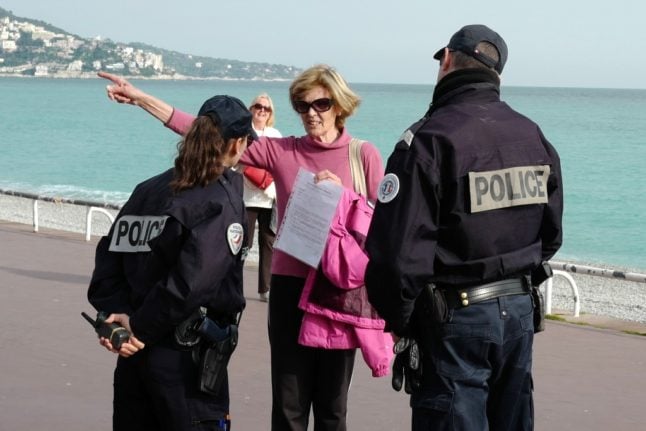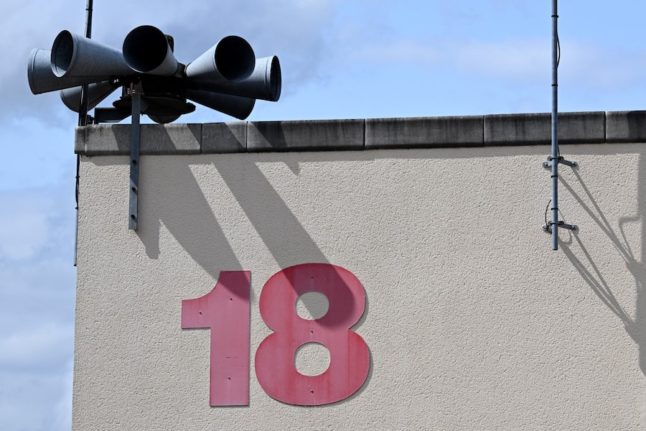Friday marked the return of the attestation, the document that justifies outings in France during lockdown that everyone must fill out before stepping out of their home.
While this lockdown is almost as restrictive as the one in March, there are a few differences when it comes to when you are allowed to leave your home.
As well as the general permission form required for leaving home there will be two “permanent attestations” that will be issued by employers for those going to work and by schools.
READ ALSO Attestations: The three permission forms you need in France to leave your home
To go to work (Se rendre sur son lieu de travail)
Going to work is allowed, as long as you fill out the attestation justifying your trip and it will be need to be signed by your employer. However, the French government has said that working from home should become “the rule”.
“Wherever possible, working from home should be generalised once again,” Macron said in his speech.
Prime Minister Jean Castex told the parliament on Thursday morning that private businesses had to make remote working the norm “five days out of five” whenever possible.
To attend and exam or a training course (Pour se rendre a des formations ou un examen)
Those attending an exam to get their driving licence or another form of exam or training course are also permitted to leave their home.
To do essential shopping (Faire des achats de 'première nécessité')
As in spring, grocery shopping is regarded as an essential errand and will feature on the attestation form for leaving the home. Going to a pharmacy or the post office will also be considered as an essential trip.
Beware however that during the last confinement, police officers sometimes did not take lightly on those who went to the shop to buy one can of coca cola or one carton of milk.
READ ALSO: Having an affair, buying lemons and walking a snake: France's weirdest excuses for breaking lockdown
For exercise or to 'get some air' (prendre l'air)
The president used the words “prendre l'air” – essentially going to get some fresh air – as an essential reason for people to leave the house. This covers exercise which was permitted during the spring lockdown as was taking the dog for a walk.
Like in the first lockdown, people will not be allowed to go beyond a 1km radius around their homes (unless it’s for one of the reasons mentioned above). Outings for walking, getting some fresh air or doing exercise will also be limited to an hour per day. Cycling for exercise is also allowed – contrary to this spring when cycling was banned for everyone bar a few exceptions – although all cycling must be done within 1km of the home.
During the first lockdown, the government told everyone to limit their outings to once a day, meaning that those going for a quick run around the block in the morning should refrain from doing their groceries on that same day.
Government spokesperson Gabriel Attal has said that parks and gardens, will be allowed to stay open.
The picture below shows the English version of the permission form which you can download here.

The decision to keep parks and gardens closed was heavily criticised during the first lockdown, especially in dense urban areas like Paris, where access to green space is limited.
Imperative family reasons or to help elderly or sick relatives (motif familial imperieux, porter assistance à une personne vulnérable)
As long as you have an attestation, helping family members in need is considered an essential trip as is reasons of child care such as handing over children between separated parents.
“Our elderly and vulnerable people often need outside assistance for their care, taking care of their household and for the delivery of their meals,” Macron said.
He did however stress that those most at risk, such as those over the age of 70, should be extremely careful and should have “fewer meetings with family and friends, even if it's heartbreaking,” said Macron.
Medical visits (se rendre à un rendez-vous médical)
As in the spring going to the doctor or another kind of medical visit such as physiotherapist or a scan.
Taking children to school or creche (Accompagner son enfant à l'école ou à la crèche)
In contrast to spring the schools and nurseries will remain open. Parents will be allowed to accompany their children to school and pick them up. It is likely this will be an option on the new permission form.
Older pupils who attend secondary schools will naturally be able to leave home.
Disabled people and their carers
Those who are physically disabled and those who care for them will be allowed to leave home with a permission form.
Judicial or administrative obligation (convocation judiciare ou administrative)
Anyone who must respond to a legal obligation such as a court summons or to attend a police station or administrative body will be allowed to leave the house with their permission form
For public interest missions (pour participer à des missions d'interet géneral)
Those who have been asked to take part in tasks for the public interest will be allowed to leave home with a permission form.
Can I visit my parent/grandparent who is in a home?
Another big difference with the first lockdown is that this time, visits to Ehpad (old people’s homes) are allowed whilst following strict health measures. Like with schools, Macron judged the consequences of keeping old people isolated too damaging to once again prevent relatives from visiting.
Can I visit a cemetery?
With France in the middle of the Toussaint (All Saints’) holiday period, in a year where many have lost their loved ones to the coronavirus, Macon announced that cemeteries will be allowed to stay open.
Return from holidays
Travelling between regions is not allowed.
However, an exception is being made for those returning home this weekend after the Toussaint holidays, which end on Monday. There will be “a tolerance this weekend for those returning so that everyone can get back home, and so that families can organise themselves,” Macron said in his speech.
on Thursday PM Castex said an “attestation sur l'honeur” would be allowed, in other words a hand written sworn statement would be enough for anyone returning from holidays.
Fines
Fines for those found flouting the rules or for those who are are not in permission of a valid attestation face a fine of €135 that could rise to €3,750.




 Please whitelist us to continue reading.
Please whitelist us to continue reading.
What a potential nightmare.
My wife is retiring and emigrating permanently (to France) in late December.
She is due to drive from Caen to Perpignan picking up a puppy en route.
Will this one-way journey be permitted without penalty under these restrictions?
We have signed a rental contract to allow us to take up residency before 31/12/20. Are foreigners allowed to travel for such reasons in the next couple of weeks? Help please !!
I need to go out and use the launderette, which is the relevant box to tick on the attestation form?
Any insight into if it is ok to go do laundry at a laverie
Any insight into if it is ok to go do laundry at a laverie
Is it permissible to return to UK for prearranged dental work. It would involve me travelling from Mayenne area to Dieppe for the ferry during the night.
Dear Local —- YOU NEED A “REPLY” function on these forums. There are a lot of people asking for help and information and absolutely no way for anyone to respond to them or to help them.
Kind of absurd, no?
It’s true ..there’s a whole demographic here that is falling between stools. Property in France ..making the move before the transition ends. Can we travel? The attestation form does not provide for us
, but some commentators think we can get away with a single journey to our french home. Has anyone done this? Is it better by car or public transport? How lenient are the police? What leeway might we be allowed as a result of force majeure?
Please include a dateline with the article